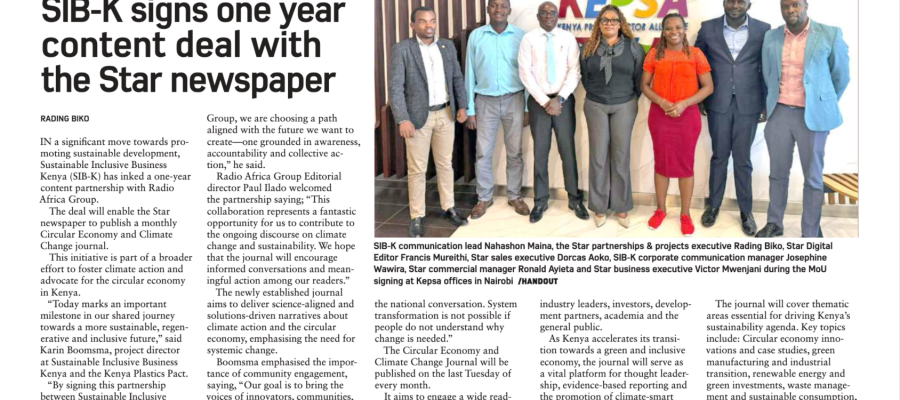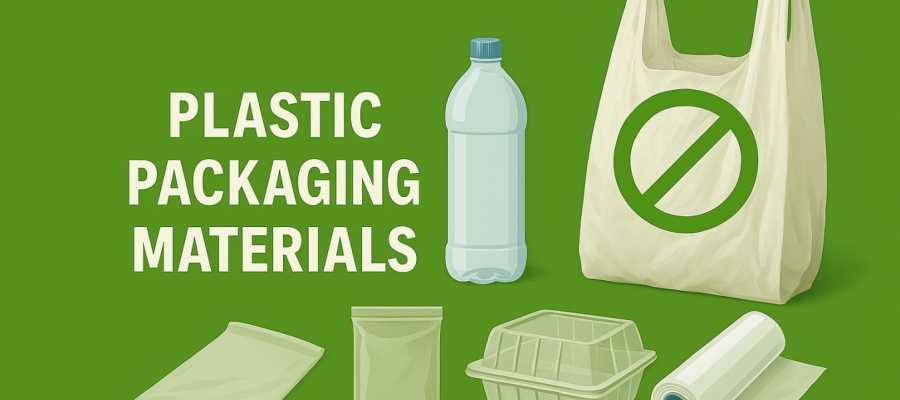Nairobi, Kenya, 29 August 2022. Today, the Kenya Plastics Pact has published a Roadmap
to ensure all
plastic packaging in the country is recyclable or reusable by 2030. More than 30 business members and
supporters of the Kenya Plastics Pact, with representatives from every stage of the plastics packaging
supply chain, have signed and endorsed the Roadmap.
They include plastic packaging manufacturers, prominent FMCG brands, committed small and medium
businesses, informal waste pickers’ associations and recyclers, influential industry associations,
environmental NGOs, advocacy groups/civil society, and the national government, as well as the national
government through the Ministry of Environment and Forestry.
“The Kenya Plastics Pact Roadmap reflects a powerful voice for tangible change by 2030 and will guide and mobilize the industry to tackle plastic pollution by taking collective action. The Roadmap activities are elaborate and based on Kenya’s context and the current situation in the country in terms of waste management, plastic pollution, the economy, the policy landscape, and available infrastructure,” says Ms Karin Boomsma, the Pact’s Secretariat Lead.
With an estimated 22,000 tonnes of waste generated in Kenya per day, about 20% of it is plastic. Furthermore, Kenya’s daily plastic consumption is estimated to be 0.03 kg per person. Available data shows that the full amount of plastic that becomes waste in Kenya is approximately 0.5 to 1.3 million tonnes per year. Out of this, only 8% is recycled, with the remainder being landfilled or incinerated – or in the worst-case scenario, ending up in the environment. This is why plastic waste and pollution have particularly captured the attention of businesses, governments, and citizens in Kenya.
According to KEPSA CEO Ms Carole Kariuki, a radical transformation in how we use natural resources is central to meeting the needs of future generations. “There is no question about it, the world needs a new economy; a circular economy, which keeps plastics in use and out of the environment. It is now more relevant than ever to bring the whole value chain together, and build collective solutions adapted to our reality.”
She adds, “It requires an ‘all-in’ approach from industry, citizens, and the government to ensure policy priorities are budgeted and appropriated for the economy to fully go circular. Companies need to strategically integrate circularity in their value chains, to increase sustainable economic development and resilience.”
The Roadmap establishes four strategic targets for 2030:
- Eliminate unnecessary or problematic single-use plastic packaging items through redesign, innovation, and reuse delivery models.
- 100% of plastic packaging is reusable or recyclable.
- 40 % of plastic packaging is effectively recycled.
- 15% average recycled content across all plastic packaging.
Each target then focuses on key outcomes laid out in the Roadmap, including defining a list of problematic or unnecessary plastic packaging and items and taking measures to address them. Improved adoption of recyclable packaging, improved informal recycling sector value chain, and improved policy engagement and policy environment for enhanced recycled content of plastic packaging are among the outcomes identified in the Roadmap. Progress will be tracked and reported annually to ensure accountability.
“This is a shared action plan that shows a cross-sectoral plan of outcomes and activities which when achieved, will stimulate industry-led innovation, dialogue, and collaboration to create new business models with product redesign in mind, generate job opportunities in the plastics collection and recycling sector, and position businesses competitively with improved economic, environmental, and societal outcomes overall,” says Dr Ayub Macharia, Director of Environmental Education and Awareness in the Ministry of Environment and Forestry.
He reiterates that “The government through the Ministry of Environment and Forestry is happy to see initiatives like the Kenya Plastics Pact that support national efforts toward achieving a cleaner and safer environment for all.”
The Roadmap goes a long way in supporting the implementation of the Extended Producer Responsibility (EPR) Regulations, which aim to enhance resource use efficiency, stimulate innovation, spur recycling, and reduce the amount of waste destined for final disposal; as provided for by the Sustainable Waste Management Act. But while it is a necessary regulatory framework to move toward a circular economy, mandatory EPR alone does not provide the collaborative platform for unlocking innovation and systemic solutions for a Circular Economy.
An enabling ecosystem, implementable guidelines, shared knowledge on material choices and improved reuse and recycling infrastructure and capacity are among the activities to drive the success of the EPR that will lead to achieving targets 2, 3 and 4.
“The Kenya Plastics Pact Roadmap is a landmark demonstration of how the plastics packaging value chain stakeholders both locally in Kenya & globally across other Plastics Pacts can come together to make real commitments towards achieving circular packaging through innovation, collaboration and action” emphasizes Akshay Shah, the Board Chair of KEPRO.
“At Silafrica, we continue to stand by our commitment to champion Kenya’s transition to Circular Economy by working with industry and regulatory stakeholders, and supporting our customers through co-creative redesign of their packaging to become reusable, returnable and 100% recyclable,” declares Akshay, who is also the Group Executive Director of Silafrica Plastics & Packaging.
Kenya Plastics Pact aims to address the barriers to circularity in the plastic packaging sector through public-private partnerships. It uses various mechanisms including working groups with active participation from members and supporters to design strategies, action plans, research, commitments and practical guidance that will support achieving the targets. The Pact scopes and implements flagship projects to overcome key challenges, and works on attracting investment and funding to unlock critical opportunities that accelerate circularity.
Marcus Gover, the WRAP CEO, says, “WRAP is delighted to have supported the Kenya Plastics Pact in the development of the Roadmap to 2030 which will mobilise not just the Pact’s signatories but also the wider plastics industry in Kenya to tackle the plastic pollution crisis. The UK Plastics Pact Roadmap launched almost 4 years ago and has helped transform the plastics value chain in the UK – we hope the same will be true in Kenya.’’
The development and implementation of the Kenya Plastics Pact are led by Sustainable Inclusive Business Kenya (SIB-K), the Secretariat to the Pact and the Knowledge Center under the Kenya Private Sector Alliance (KEPSA); with support from WRAP – the UK-based global environmental NGO, and initially funded by MAVA Foundation and UK Research and Innovation (UKRI). The Pact is part of the Ellen MacArthur Foundation’s Plastics Pact Network and is the second in Africa after the South African Plastics Pact.
For more information, contact Josephine Wawira – Kenya Plastics Pact Communications Lead
Mobile: +254 710374677
Email: communication@kpp.or.ke
About SIB:
Sustainable Inclusive Business – Kenya (SIB-K) is a knowledge centre under the Kenya Private Sector Alliance (KEPSA) funded by the Netherlands Government. The project aims to encourage businesses to be sustainable and inclusive, positively impacting People, Planet, and Profit. This is achieved through sharing information on best practices and viable, sustainable business models, implementing sustainable business policies, and creating partnerships. SIB-K is the lead organization implementing the Kenya Plastics Pact.
About WRAP:WRAP is a climate action NGO working around the globe to tackle the causes of the climate crisis and give the planet a sustainable future. Our vision is a thriving world in which climate change is no longer a problem. We believe that our natural resources should not be wasted and that everything we use should be reused and recycled. We bring together and work with governments, businesses and individuals to ensure that the world’s natural resources are used more sustainably. Our core purpose is to help tackle climate change and protect our planet by changing the way things are produced, consumed and disposed of. We support partner NGOs around the world to deliver real change through collaboration and progress from over 300 of the world’s largest businesses. Initiatives we support include Plastics Pacts in Chile, Kenya and India; food waste agreements in Mexico, South Africa and Indonesia; and food waste citizen campaigns through our Love Food Hate Waste brand in Canada, Australia and New Zealand. We are also supporting the Danish industry collaboration on fashion and textiles.


